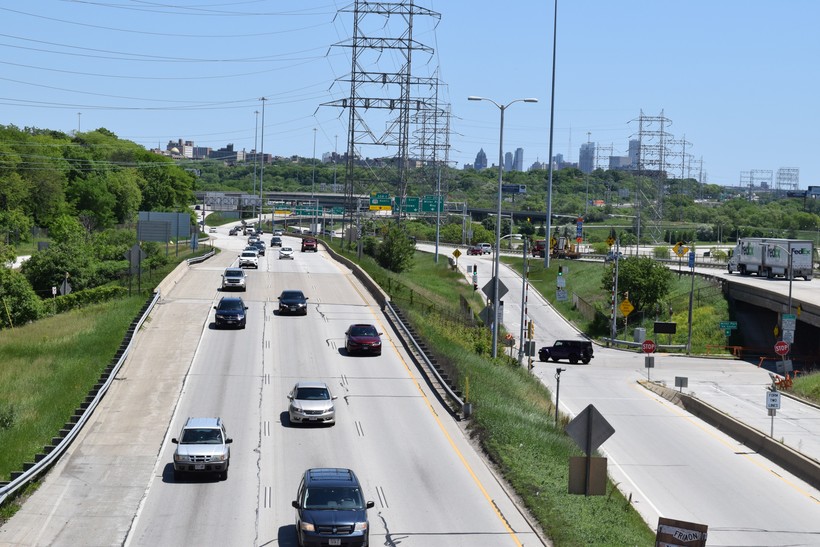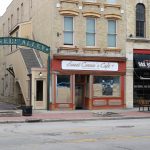Federal Government Investigating Civil Rights Complaint About I-94 Expansion
Groups oppose plan to expand, but not rebuild highway through Milwaukee's West Side.
Opponents of a proposed interstate expansion in Milwaukee are arguing those plans should be put on hold because the project is now the focus of a federal civil rights investigation.
The Wisconsin Department of Transportation announced plans in 2022 for a $1.2 billion project to expand Interstate 94 on the city’s west side from six lanes to eight — four lanes in each direction — on about a 3.5-mile stretch of highway that passes the Brewers’ American Family Field.
Opponents of the project believe the expansion would negatively impact people of color, as a majority of Black and Hispanic residents live along the corridor.
Cassie Steiner, the senior campaign coordinator for the Wisconsin chapter of the Sierra Club, is calling on Gov. Tony Evers to halt the project because of the civil rights investigation.
“Highway expansions have caused decades of harm, especially to Black and Brown communities,” Steiner said.
Environmental activists have argued that more gas-burning cars on the road will lead to more carbon emissions in the air, contributing to climate change. They believe the expansion will make climate change and air pollution worse in the area. Environmental attorney Dennis Grzezinski said the project is located in a corridor that has a “larger proportion of Black and Hispanic residents than can be found in any other community in the region.”
Aside from increasing noise and air pollution as more cars zip down a wider highway, some residents also worry the addition of about 29 acres of asphalt — the equivalent of more than 20 football fields — will increase flows of stormwater into the area.
“Who’s it going to impact? Not the folks trying to get to downtown during rush hour from richer, whiter neighborhoods and communities, but the folks who live in and around the center city,” Grzezinski said.
Last year, community groups and opponents of the project sent a civil rights complaint to the Federal Highway Administration. The complaint said if the project goes forward, people of color will “bear the brunt of the impacts of highway construction and expansion, while whites, especially white persons living in highly segregated suburbs, will reap most of the benefits.”
“This will compound and exacerbate the historical, longstanding disparities and injustices to which these Milwaukee communities have been subjected,” the complaint said.
That included the American Civil Liberties Union of Wisconsin. In a statement, Karyn Rotker, senior attorney with the ACLU of Wisconsin, said the project is “bad for Milwaukee and its residents.”
In a letter to the ACLU, the Federal Highway Administration confirmed an attorney with its Office of Civil Rights is now investigating the complaint, under Title VI of the Civil Rights Act of 1964.
Wisconsin Department of Transportation Secretary Craig Thompson has said the highway section needs to be rebuilt, but doing so without expanding lanes doesn’t make financial sense and isn’t safe. He’s also called the highway “the busiest artery in the state” and said repairing and expanding it would help boost the state’s economy.
Advocates in favor of the proposal include local business groups and labor unions. In a letter signed by International Union of Operating Engineers Local #139; Iron Workers Local #8; North Central States Regional Council of Carpenters and Wisconsin Laborers’ District Council, the union members said the project would create up to 10,000 jobs.
A letter from the National Association of Minority Contractors Wisconsin Chapter also states the project would deliver between $100 million and $115 million worth of contracts to small, minority and women-owned businesses through DOT’s Disadvantaged Business Enterprise program.
Steiner said she’s in favor of the corridor being repaired, but doing so in a way that doesn’t add any more traffic lanes.
“We do think that construction work is important, we do think that union jobs are important and those certainly come with repairing the road in its current footprint,” Steiner said. “Building new lanes is not the only construction job that gets created.”
In a statement, a spokesperson for the Wisconsin DOT said they’ll continue to work with community members and stakeholders.
“Adhering to the Title VI requirements is part of the process for any infrastructure improvement project. WisDOT is happy to cooperate in this process. We are proud of the work we’ve done to this point and remain committed to delivering effective transportation solutions for the people of Wisconsin,” the statement said.
Listen to the WPR report here.
Opponents of proposed Milwaukee I-94 expansion call for pause after federal investigation was originally published by Wisconsin Public Radio.
More about the I-94 East-West Expansion
- Transportation: 27th Street Bridge Closes Next Week - Graham Kilmer - Jan 26th, 2026
- Transportation: 27th Street Bridge Will Close For A Year - Graham Kilmer - Nov 29th, 2025
- Coalition Raises Concerns on I-94 Construction - Sierra Club - Nov 12th, 2025
- Construction Starting On $1.7 Billion Interstate 94 Widening - Jeramey Jannene - Oct 15th, 2025
- Governor Evers approves first segment of I-94 East-West construction to begin in Milwaukee County - Wisconsin Department of Transportation - Oct 15th, 2025
- Transportation: Fix At Six Coalition Sues State, Federal Government Over I-94 Expansion - Graham Kilmer - Aug 20th, 2024
- WisDOT to host I-94 East-West Freeway Project public meetings - Wisconsin Department of Transportation - Jun 12th, 2024
- Open Houses Announced For I-94 Widening - Jeramey Jannene - Jun 6th, 2024
- ‘Fix at Six’ Group Wants I-94 Expansion Delayed For Civil Rights Report - Jeramey Jannene - Mar 20th, 2024
- Coalition Admonishes I-94 expansion Record of Decision - Sierra Club - Mar 20th, 2024
Read more about I-94 East-West Expansion here
Transportation
-
Congestion Pricing Cuts Air Pollution in New York City
 Dec 14th, 2025 by Jeff Wood
Dec 14th, 2025 by Jeff Wood
-
FTA Tells Milwaukee to Crack Down on Fare Evasion — Even Where Fares Don’t Exist
 Dec 12th, 2025 by Graham Kilmer
Dec 12th, 2025 by Graham Kilmer
-
Will GOGO’s Bus Service Ever Get Going?
 Dec 9th, 2025 by Jeramey Jannene
Dec 9th, 2025 by Jeramey Jannene























Black and brown people, as well as every other hue of people, are subject to fumes of cars idling during rush hours in this short stretch of six lane road as they travel to work and other activities. Less congestion and fewer car spilling onto neighborhood streets trying to avoid the daily backups will be a positive for them.
It is tragic that we are such a car dependant society, but we can’t go back to 1945. We should have kept the interurban system but like most cities, we didn’t.
I’m not very likely to spend an hour to take a bus to work or to shop at Menards and neither are the people who are using this tactic to try to stop this. It may have been a civil rights issue when the road was first built (more so with I-43 than I-94 in that era), but is isn’t with this expansion which will take one house in a majority white area. Let’s be honest here… The folks using this civil rights issue are likely primarily white and have their own agenda. Cynically, I’d say they are using black and brown people to try to get their way.